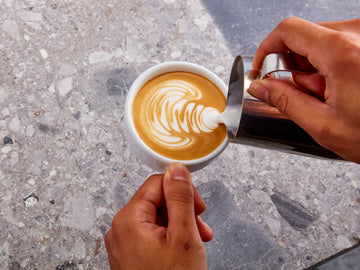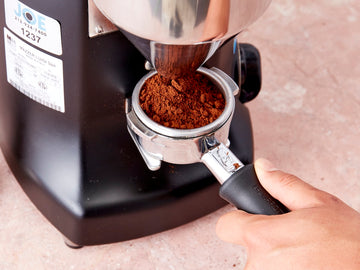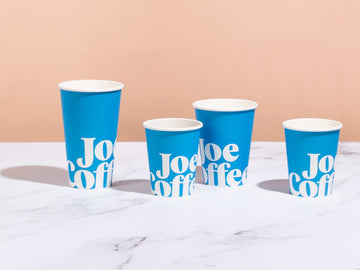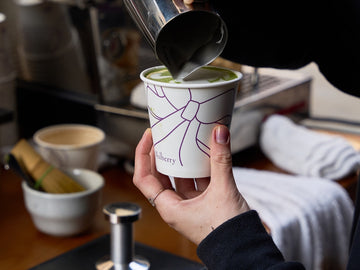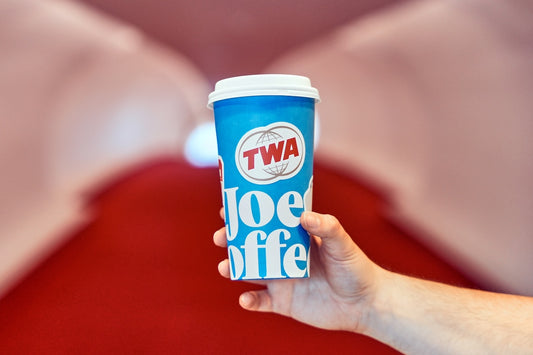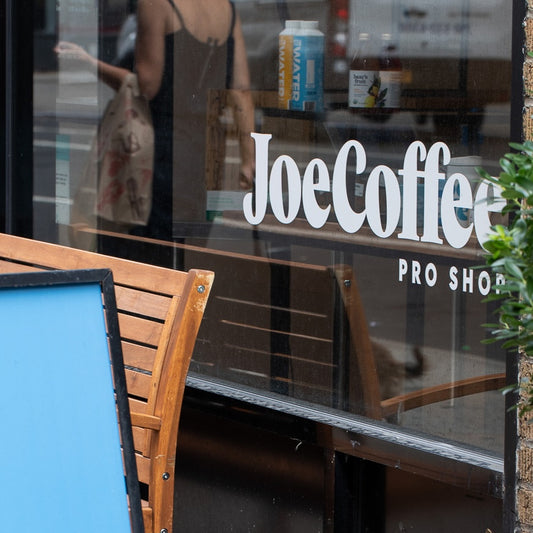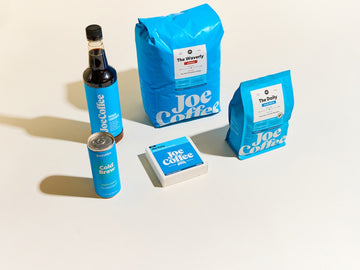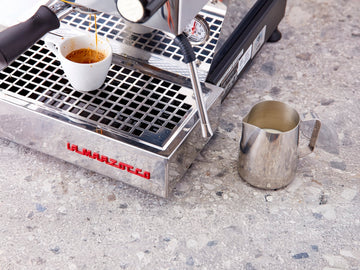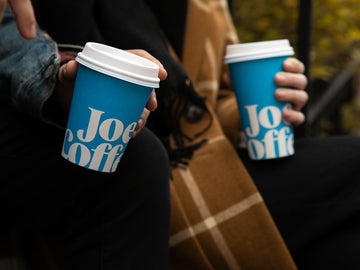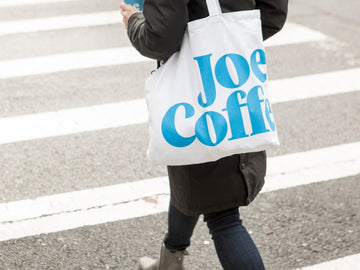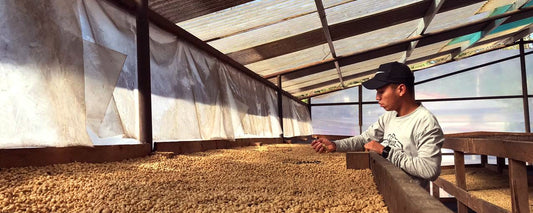Partners
Categories
All articles
Building Power with Community Voices Heard
This October, Joe Coffee is proud to support Community Voices Heard (CVH) through our in-cafe round-up campaign. CVH is a member-led, multiracial organization made up primarily of women of color and low-income families across New York State. For 30 years, they’ve been building power and driving change—tackling housing justice, economic equity, and civic participation through grassroots organizing and leadership development.
We sat down with Juanita Lewis, Executive Director of CVH, to talk about their mission, their impact, and how every round-up donation helps create a more just and equitable New York.
Since our last interview in 2021, what milestones or shifts has CVH experienced that you're most proud of?
I'm incredibly proud that we celebrated our 30th anniversary last year. Thirty years of organizing with low-income people of color, building power, and winning real change for New Yorkers.
I also need to be real about what we've faced in this last year alone. We've had to double down after an onslaught of attacks from the federal government. In February, our members from across our four chapters traveled to Albany and held meetings with over 40 New York representatives to demand our State step up. And in May, CVH Power members traveled to DC to fight back against cuts to HUD, SNAP, and Medicaid
We've also been holding People's Assemblies with our local elected officials in the Hudson Valley and Harlem to make sure they're hearing directly from their constituents. When the federal government tries to dismantle the safety net, we organize harder. That's the shift: we're not only defending what we have, we're demanding more.
How has CVH's work—and the needs of the communities you serve—evolved over the past few years?
The needs have intensified, honestly. Coming out of the pandemic, we saw the devastating impact on Black and brown communities – the economic instability, the housing crisis getting worse, the ongoing threats to our democracy.
What's evolved is our understanding that we can't just respond to crisis after crisis. We need to build a sustainable base. Our work has become more explicitly focused on centering Black women's leadership through our Follow Black Women project, because we know that's where transformative change comes from. We're not just organizing around individual issues anymore – we're building the infrastructure for long-term power.
What're some of the biggest challenges CVH is facing in 2025?
We are witnessing the same kinds of attacks that sparked CVH's creation. The federal government is once again targeting the most vulnerable among us: slashing safety net programs, undermining voting access, and demonizing those who use public assistance. It's a scary time for our communities, and the threats feel both familiar and urgent.
But here's what gives me hope: CVH was created precisely for moments like these. We were born out of necessity when our people were under attack, and we have spent three decades building the power to fight back. This is what we were made for.
Can you share a story of a recent campaign or initiative that illustrates CVH's impact on everyday New Yorkers?
I want to tell you about our East Harlem tenants who took on one of the city's worst landlords. Nearly 40 tenants across five buildings on East 103rd Street organized with us because their landlord had created unbearable living conditions – mold, blocked fire exits, a hole in the roof, doors that locked people inside their own buildings. But it was worse than just neglect; this predatory equity firm had stolen tens of thousands of dollars in security deposits from tenants.
CVH organized the tenants, we partnered with Legal Aid Society and Legal Services NYC, and we filed a lawsuit. Ultimately, we won almost $500,000 for those tenants. That's the power of organized tenants standing together.
What does "building power" look like for members of CVH in practice, and how do you see that power growing in the years ahead?
At CVH, we say “power” is organized people and organized money.
Building power looks like a CVH member going from never having knocked on a door to leading a team of other members. It looks like our members testifying at the City Council, meeting with their elected officials, and shaping policy agendas. Through our Ella Baker School for Organizing, we're always training the next generation of organizers.
Looking ahead, I see our power growing as we deepen our Follow Black Women infrastructure, as we connect fights across the state, and as we win policies that give people more time and resources to organize and just live their lives. Power grows when people see themselves winning and bring their neighbors into the fight. And power grows when we have this kind of monetary support from everyday people.
How has the Follow Black Women project grown since we last spoke, and what change has it sparked so far?
Follow Black Women has grown from a bold idea into real infrastructure. We surveyed over 5,000 Black women across New York State and found that education, housing, and healthcare are the priority policy areas for change. This year we organized a series of events focused on how we show up differently for this work because the conditions are different. The events included visioning sessions, panels on rest, and trainings on Ranked Choice Voting. These events set the foundation to build a policy agenda created by Black women that will guide lawmakers in 2026 and beyond.
This September, we held a powerful event with 100 Black women, Attorney General Letitia James, and mayoral candidate Zohran Mamdani to present our top priorities for the next mayor. We're holding two more sessions in October and November for Black women to dive deeper into writing a mayoral agenda. This is what it looks like when Black women move from being acknowledged as the wheels of political movements to actually being the drivers.
What does it mean for CVH to center the leadership of Black women, and how do you see that shaping broader movements for justice?
For more than 100 years, Black women have led America's progress on human rights. We know this, so why aren't Black women setting the agenda and driving policy?
When we center Black women's leadership, we're building from the most intersectional analysis. Black women experience racism, sexism, and often economic exploitation simultaneously. Solutions that work for Black women work for everyone.
I see this shaping broader movements by demonstrating that the most transformative change comes when those most impacted are leading. We are the architects of our liberation.
We're running a round-up campaign in cafes this month to support CVH. How do you see small, everyday contributions like this playing into larger movements for change?
Here's the truth: we've grown from a small and mighty group into a statewide, power-building machine, and that happened because of sustained support from everyday people.
When someone rounds up their coffee purchase to support CVH, they're making a statement about what kind of world they want to live in. They're investing in member leadership, in organizing infrastructure, in the long-term work that doesn't make headlines but builds power. Those contributions add up to door hangers, to organizing trainings, to trips to Albany and DC. And just as importantly, it means we're accountable to our communities. That's how movements are sustained – not by one big check from one big donor, but by many people investing in the future together.
Next time you’re in the cafe, round up your order and join us in supporting Community Voices Heard’s mission this October.
Q&A with Juanita Lewis, Community Voices Heard
Community Voices Heard (CVH) was founded in 1994 and is the largest Black-led, member-driven, grassroots, principally women of color and low-income families organization in New York State. Back around this time last year, we first began working with CVH with the release of our Rockefeller holiday coffee, where $1 of each bag sold went to support their work building power to secure racial, social, and economic justice for all New Yorkers. This year, we're thrilled to share we'll be partnering up again on an upcoming coffee—more on that soon!—but in the meantime, we wanted to take this Giving Tuesday as an opportunity to sit down with CVH executive director Juanita O. Lewis for a look at the group's history, current projects like Follow Black Women, and their vision for an equitable future.
Looking for more ways to support Community Voices Heard? Please consider making a donation here.
Q: Can you walk us through the formation of Community Voices Heard? Where did it begin and how has it evolved since its formation?
A: Community Voices Heard (CVH) was founded in 1994 in response to the Clinton-era changes to welfare. Many of these families were forced to participate in the Welfare to Work program in order to receive public assistance. There were very few grouops organizing those on public assistance to make policy changes to address systemic issues. From the early leaders who were fed up with the exploitative work requirements imposed on welfare recipients by federal and local government to those who have, and currently drive, a broader agenda to secure a just social safety net, family-sustaining jobs, and access to them as well as truly affordable housing, and thriving communities—throughout the organization’s evolution, encouraging participatory democracy of the most marginalized has remained critical to CVH’S mission. CVH has not only expanded its issue focus but its reach with chapters in New York City, Westchester County, Orange County, and Dutchess County.
Q: Where does CVH Power come in? So often we speak about the challenges but you all are an action-based group, can you share your successes with us?
A: In 2012, members and allies of CVH decided that a seat at the table was not sufficient if its occupant did not wield enough power to enact the radical policy change necessary to center communities of color state-wide. Thus, CVH Power! was established as a political entity that would intentionally change the structure of New York’s political landscape. At CVH Power, we seek out, politically educate, train, and endorse candidates of color; we also support persons that ideologically align, support, and further our mission to advance low-income communities of color across New York State. In 2021, we ran our largest political program, where we endorsed 20 people total in NYC and Yonkers. We reached over 100,000 voters between face to face conversations, phone banking, and texting. 17 of the 20 candidates won their races. We are excited to build a co-governing agenda focused on racial, social, and economic justice with this cohort of officials.
Q: We're living in a time that's both quite complex and unique... but also reminiscent of a historical holding pattern when it comes to social justice. What are your thoughts on where we are right now and how we can break out of the pitfalls of the past?
A: The impacts of Trump, the COVID-19 pandemic, and Black Lives Matter uprisings have renewed an interest in organizing and lifting up the voices and experiences of those who are impacted by these issues. There is also more interest in scrutinizing structures to explore what reforms are needed to yield more equitable outcomes. It is more evident than ever that we need to continue building grassroots leadership that creates and leads a progressive agenda.
Q: Is there anything related to Community Voices Heard that you're most passionate about, see yourself as being the most uniquely capable to accomplish, or that you're most looking forward to working on in the near future? What initially drew you into the work at CVH?
A: I came to CVH almost 13 years ago because of the member-led vision and mission. Members take on roles identifying campaigns, building strategy, and taking action. It is wonderful to see the transformation of members as they take on these roles. I am looking forward to holding our statewide member campaign sessions in person, continuing to build our Follow Black Women project, and leading trainings through our Ella Baker School for Organizing.
Q: Lastly, since we are a coffee company, and we are attempting to connect our immediate communities with our larger, global coffee community -- do you have anything to share about the power of women everywhere?
A: In 1977, Barbara Smith and the Black feminist visionaries of the Combahee River Collective observed, “Until Black women are free, none of us are free.” The Black women of the Combahee River Collective remind us: it is racial justice that will bring us all democracy. American democracy, as it turns out, is on the side of freedom and racial justice only because Black people—and Black women, in particular—have organized to make it so, locally and nationally.
Q&A with Jim Ngokwey, Mighty Peace Coffee
Jim Ngokwey is a Managing Partner at Mighty Peace Coffee, an importing company working exclusively with coffees and communities in the Democratic Republic of the Congo. We met Jim, who is Congolese himself, in early 2019; but of course, COVID was soon on our doorstep. Nevertheless, knowing Jim has taught us a lot about the impact of, and, more importantly, the potential for, the coffee industry in the Congo. Through collaboration with Mighty Peace, we have developed a deeper understanding of coffee’s history as a Black history, in order to find our agency and place within it. Jim speaks very passionately about the core mission of Mighty Peace—to “support communities transitioning from war to peace in parts of DRC that have been victimized by the conflict.” He sees the potential for using the coffee industry intentionally to face the challenges that Congo inherited, and has chosen to take action through his work. We sat down with Jim ahead of the launch of our new Atlas Collection release, Congo Mapendo, to talk all things coffee, gender equity, and the impact of COVID-19 on coffee producing communities in Congo. Q: We were so pleased to taste a women-grown coffee when you first offered us the chance to try it. Could you share about the decisions and goals to separate out this coffee grown by female producers in Congo? Was it a choice the growers made themselves? There is so much to learn about gender equity expressed in different places, and it seems to us that there is already a lot of value placed on women in Congo, so we're trying to better understand that and learn from their strong example.A: Before diving into the answers, I'd like to share that gender equity is important to Mighty Peace Coffee; we're very proud to be led by women executives, Liza and Linda. We are working on initiatives to up-skill women in Congo to have more women understand the quality and business side of the industry and attain higher paid positions. We're intentional about this as a lot of research out there shows that women spend most of their income on their families, a lot more than men, and that when you work on social impact, economic empowerment and poverty eradication, we believe women must have multiple seats at the table.The decision to separate out Mapendo (men and women) and one exclusive from women producers, Mapendo Women, was spurred by an NGO operating in the DRC called Elan RDC. Elan RDC was financed by UKAID and its mission was to increase the income of at least 100,000 people across various industries in the DRC. Gender equality and social inclusion is one of its key pillars and that’s how the idea to separate into a women-only lot came about. The goal was to proactively identify women producers in the cooperative and seek their coffees specifically, help them improve quality, and increase their income. Additionally, Linda has an extensive network in DRC and she always had great relationships with these producers, had tried their coffee in the past and early in 2020, and we started discussing how Mighty Peace Coffee could work with them. It started with free workshops that Linda would conduct with the cooperative, and as they started implementing her feedback, we started discussing working together on lots that we would purchase in 2021. The impact and feedback have been overwhelmingly positive and Mapendo Women will be on our offering list every year moving forward. Q: When it comes to gender equity in Congo, or this group of women specifically—what's their vision for their future?A: They are working on various projects, many of which are around creating additional streams of revenue. Livestock and goat breeding in particular is a key project the women have worked on. Through this initiative they were able to raise and sell more than 1,000 goats, which is an important additional source of revenue for them and their families. A key priority for next year will be to evolve the goat project, to include chickens and pigs as well for further diversification and additional income streams. Other short- and long-term projects include the construction of a clinic for women, to provide quality healthcare services in closer proximity to where producers live, to reduce and sometimes eliminate travel time to access healthcare. Another major initiative for the rest of the year and 2022 is to increase investments in AVEC (Association Villageoise d’épargne et de Crédit), which translates to Village Association for Savings & Loans. It operates like a credit union and provides loans to the community. Q: The name Mapendo—love—is so powerful. Reading about the history of the women, some of them widows, was really meaningful to us. Was the name given to the coffee product first, or the community group first?A: The name Mapendo came from conversations with our team on the ground and the producers; we wanted a name to identify the lots that are being produced for Mighty Peace Coffee and would represent the meaning and message they want to put out to the world through their partnership with us. That has been our approach with all offerings; brainstorm the message and meaning they want their coffee to have in the world, and name their offerings that way. This collaborative approach to naming the coffee, instead of naming it after the washing station or territory, fosters further ownership and engagement in this partnership, and allows the community to play a role in the story and meaning their coffee conveys to the world. Q: We often talk about our shared challenges in this pandemic age. Could you share about the successes of the community of coffee growers that the Mapendo women are a part of? What do they feel proud of that they have accomplished over the past couple of growing seasons with the pandemic limitations?A: Progress on the construction of the clinic and additional funds for the AVEC credit union were some of the brightest spots. But overall, the pandemic has been extremely challenging. Many producers abandoned their fields especially as buyers cancelled orders early on; times were particularly hard during lockdowns. As there wasn’t much traffic and much movement, their side businesses came to a screeching halt and many who expected to earn additional revenue through goats were hurt as their finances tightened. They weren’t able to provide veterinary care to their animals and quite a few ended up losing their goats. Despite these extreme difficulties, there were examples of success in the pandemic; a producer named Charlotte Fikiri is one such example: she was able to take care of her goats and sell a few during the pandemic, and she used this additional income to purchase more land on which she’d produce and sell more coffee. There unfortunately weren’t many women as successful as Mrs. Fikiri, but as vaccines are starting to become available in Congo, we expect to have many more such stories next year.
Women-Led Businesses We Love
You know and love their delicious scones, cookies, turmeric elixir, and vegan bites, but do you know the women behind your favorite treats in our cafes? As we continue to celebrate Women's History Month, we're recognizing the many female founders whose small, local businesses provide the perfect pairings to our coffee, or in the case of one of these founders, brings us your favorite coffee-alternative!Here are their stories. Anjali Bhargava, Resilience Growing up surrounded by Indian culture, food, and philosophy, Anjali always trusted in the power of turmeric. It was her pursuit of wellness and her own health struggles which led her to start Resilience, in 2014. Today, you can find Anjali's sunny, immune-boosting elixir in our hot and iced turmeric lattes, or you can buy the elixir to get creative at home! What is your favorite part of what you do?I love that I make products that brighten people's days. Whether they are drinking it for their health or because they love the taste, it's usually a moment they relish. I think about that every time I take my own first sip of my daily cup of my elixir and it never fails to make me smile.Favorite way to drink Resilience?During allergy season I love it in hot water with a little honey. In the summer I love it in a glass of seltzer or lemonade!What advice do you have for women starting their own business?You're awesome and you have to trust your gut, but your success will be a team effort and the earlier you realize this, the more joy you will find in the journey. Find friends who are in the arena with you, they will understand you and keep you sane. Agatha Kulaga, Ovenly Agatha is the founder and CEO of Ovenly, an award-winning NYC bakery which happens to be one of our oldest wholesale partnerships! You may know Ovenly as the makers of the epic peanut butter cookie or the many delicious loaf cakes in our cafes. Along with her partner Erin Patinkin, Agatha has led Ovenly since 2010, seeing the brand as "an opportunity to change business for the better, while satisfying your sweet tooth." What is your favorite part of what you do? The most rewarding thing is being able to create joy for so many people on a daily basis through the work we do at Ovenly.What's your favorite thing to bake? I love to bake up cream scones because they are a blank (and delicious!) canvas for whatever sweet or savory flavor addition I'm in the mood for. A few of my favorite combinations are Cheddar Cherry Basil, Prune & Ginger, and Milk Chocolate & Salted Honey.Favorite Ovenly item?
That would be like choosing a favorite child! If I could choose three, they would be our Pistachio Cardamom Bread, Blackout Cake, and Peanut Butter Cookie.What advice do you have for women who are interested in starting their own business?The businesses we build can be our strongest voice. As woman entrepreneurs, we have the opportunity to change the world while redefining the idea of success. The key is to do things before you’re ready, otherwise someone might just beat you to it! Danielle Sepsy, The Hungry Gnome
Danielle Sepsy is the founder and Chef behind The Hungry Gnome, makers of the scones, muffins, and nutella-stuffed banana bread we introduced to our cafes last summer. Danielle's love of cooking began at the young age of 13 when she started a home business selling her scones to friends, neighbors, and local cafes and businesses. Today, Danielle is known as the "Scone Queen" by devoted fans, or "gnomies". Keep an eye out for her new seasonal Lemon Poppy Muffin, arriving in April! What is your favorite part of what you do? I love to create new recipes. Sometimes ideas come to me at midnight and I can’t sleep until I make it! I love to create baked goods and dishes that are new and innovative, but also really nostalgic, so when people take a bite it may bring them back to a really special moment in their life. Watching people eat and enjoy my food is the best feeling in the world, and it makes all the hard work worth it.What's your favorite thing to bake?My favorite item is the Chocolate Chip Scone partly because it is how the business started! I am also a serious chocaholic and so the melty semi-sweet chips combined with the buttery, crisp, yet moist dough is something I can never get sick of.What advice do you have for women who are interested in starting their own business?Learn from others first. Gain experience in the field your starting the business in so you can learn the ins and outs, no matter how “small” the job may be. If it’s a restaurant for example, learn how to do the finances, but also how to use (and fix) the dish machine, trust me it’ll all come in handy. Building relationships is also a key to success whether it be with vendors, potential customers, employees or perhaps a mentor. When I started my business I knew just to who call when it came to ordering supplies and ingredients to which employees I wanted to hire.
Caitlin Makary, Dank Brooklyn
Fueled by a passion for banana bread, Caitlin founded Dank Brooklyn in Bed Stuy in 2016. We love Dank not only because their mini vegan loaves are delicious, but because Caitlin has worked to build a company that truly supports its people and community. What is your favorite part of what you do?My favorite part of owning my business is working with other amazing owners / managers around the city and working with the groups we support. I love meeting new people, which is easy when we have clients all over the city! Being able to experience so much of NYC and combine my personal interests (bike riding, climbing, social justice) together with my job has been incredibly fulfilling.Favorite Dank item?The first and only item we offered when we started in 2016 was the Chocolate Chip Banana Bread; so that will always be a favorite. However the Lemon Matcha is probably my new favorite. I had no experience working in food prior to starting Dank (I used to be a clothing designer), so recipe testing still makes me a little nervous... we were supposed to launch this flavor in March 2020 and had to wait until November. I'm SO happy with how it turned out!What advice do you have for women starting their own business?Trust your instincts and your experience. The only way to try something new is to start from the bottom, which is hard if you are leaving an established career. Try to learn as much as you can from others, never be afraid to ask questions, and Google everything! I started this business with literally zero prior food experience; I had never even waitressed or bartended. I leaned hard on my design experience for our voice and branding, my experience working in an office to get our back systems set up and organized, and my friends/family who worked in food to give me feedback and advice, and my NYC community to show us love and support. 5 years later we've made it through a pandemic; and kept *all* of our staff paid their regular wages throughout. Never give up but don't be afraid to shift directions. I've worked harder on this business than anything else I've ever done, but it is my favorite job I've ever had. :) Karen Lauterstein, Sattva Vida Ever since we began carrying Karen's energy bites in 2017, they have become a mainstay on our counters, fueling many-a-New Yorker with their vegan, gluten-free goodness! After 20 years in corporate America, Karen channeled her passion for clean, home cooked food into Sattva Vida, which translates to "pure life" in Sanskrit. Sattva Vida's mission is to help busy people trade their processed, sugar-filled snacking habits to simple, fresh food. What is your favorite part of what you do?Hearing positive feedback from our customers about our Energy Bites! Especially, when they tell us our bites helped them stop eating processed sugars, or jump start a healthier lifestyle. I came from the corporate world, so I also love waking up every day (without an alarm clock!) and building my business in a tee shirt, jeans & a smile. It's exciting to carve a completely new path for myself and my company—learning, growing, and building every day.Favorite Sattva Vida energy bite?It's a toss up! I'm really feeling Off the Walnut these days. That flavor happens to be the first one I ever made.What advice do you have for women starting their own business?I keep two inspirational quotes above my desk, "Be brave, not perfect" and "You have to believe in yourself—that's the secret."* As for tactical advice, NYC has tons of free & incredible resources for new entrepreneurs—from mentors, to workshops, to full length courses with certificates. I've probably taken advantage of all of them, including: SCORE, Evergreene Exchange's SFPN (Small Food Producers Network,) Kauffman FastTrac (New Ventures Program,) the SBA etc.Specifically, SCORE has a team of 75 experienced mentors who you can meet with for free. They have various areas of expertise such as legal, marketing, retail, distribution, finance, etc., I've been meeting with my mentor, Elliot, regularly for years now. His guidance, support, mentorship and friendship has been invaluable. Go to SCORE, get a mentor or two. Take classes, network, and go to events & pitchfests. Research what your business will need early and often. Last but no least, have fun and enjoy what you do!*quotes, Reshma Saujani and Charlie Chaplin Kate Wheatcroft, Bien Cuit
In 2011, Kate and her husband, James Beard Award finalist Chef Zachary Golper, opened Bien Cuit in New York's Boerum Hill. Since then, Bien Cuit has become a neighborhood staple and destination for some of the city's finest breads and pastries (like the croissants you'll find in our cafes). With her husband overseeing the culinary side of the business, Kate has helped expand the business over the last decade to encompass two bakeries, wholesale, and e-commerce. What is your favorite part of what you do?My favorite part is starting new projects. This year during the pandemic we really built out our e-commerce business for the first time and it has been really exciting!What inspired you to open Bien Cuit?My husband and business partner is a baker by trade and he had spent a decade working as a baker. I agreed to help him get started. I think I didn't realize exactly what I was signing up for, but have had a lot of fun!Favorite Bien Cuit item?Chocolate croissant—it is a classic and I'm a huge sucker for both chocolate and flaky pastry.What advice do you have for women starting their own business?Make sure to pace yourself. It is easy to think you should take every opportunity that comes your way, but being really discerning I've found is the key to success.
Q&A with Fincas Mierisch
2020 has been a difficult year up and down the coffee supply stream. With demand on the decline, producers like our friends at Fincas Mierisch have had difficulties finding buyers for their high-quality, meticulously cared-for coffees. As roasters, we too have felt the constraints caused by the global health crisis, unable to be the good partners we have been in the past, but eager to help. This dynamic is what led us to collaborate on the release of the The Mierisch Project Box Set, a collection of three special coffees from the Mierisch family's farms in Honduras. As a vertically integrated business, Fincas Mierisch is responsible for producing, exporting, importing, and roasting this coffee. We're excited to be able to offer this incredible set directly to our customers—an effort to share risk with our friends and partners in an unprecedented time.On the heels of the release of this set, we took a moment to connect with Wingo Mierisch to hear how they've fared this year.Q: How has the pandemic affected you all personally?
A: The pandemic has been especially hard because we lost someone that was with Fincas Mierisch for over 50 years: Enrique Morraz. Losing him was like losing a family member. Our dear farm manager of our farms in Honduras passed away due to Covid in July.
Q: When did the worst of the pandemic hit Nicaragua, and what was the response from the community and local authorities?
A: May/June were the worst months for the pandemic in Nicaragua and Honduras as this was the time when hospitals reached full capacity. The Nicaraguan government initially didn’t take the virus very seriously, even claiming that it was just another strain of the flu so their response was really slow and inadequate. No restrictions or work closures were enforced in Nicaragua. Honduras had a better response, they closed their borders (essentially locking us out of Honduras since March) and restricted the days and where people could travel (also which business were allowed to stay open). However, these restrictions in Honduras did have a toll as many producers were not able to buy all necessary supplies to prepare for the next harvest and many had issues with coordinating exportation dates with the shipping lines that were working with minimal staff. In Honduras local authorities, such as the ones near our farms, restricted access in and out of the villages. Local authorities in Nicaragua were initially pretty relaxed but now there is an information campaign going on to inform and educate people on best practices to prevent the spread of Covid. Especially in Nicaragua, the brunt of the burden was taken on by individuals, communities, and private businesses to instill and follow safety protocols.
Q: Did you take on responsibility for your crew in ways that differed from the official/governmental response? How were your teams affected by all of that?
A: In Nicaragua we pretty much had to take full responsibility for our crew as the government response was inadequate and neglectful. We made sure to purchase and hand out masks and alcohol gel/spray to our entire team, enforced social distancing, created smaller crews/shifts, and we even have taken the extra step to hold meetings with our team and fellow producers to talk about best safety practices to prevent the spread of Covid. In Honduras, thankfully the government has been more helpful with their response so we do not have to take on as much responsibility with providing PPE, as the government was giving these out, but we still made sure to educate and try to enforce from afar the proper safety protocols. After the death of Don Enrique we paid out of pocket to get everyone at our farms in Honduras tested for the virus.
Q: Did you see a difference between the impact of the virus in Nicaragua and Honduras?
A: It’s difficult to tell exactly how Nicaragua was affected as the government hasn’t been releasing information (and the information it does release should be taken with a grain of salt). But from what we can tell Honduras, the country, was affected more probably because of the higher population and very densely populated major cities (Tegucigalpa and San Pedro Sula). Official death tolls in Honduras are much higher than the official death tolls in Nicaragua (but again, take the Nicaraguan death toll with a grain of salt).
Q: What are some of the long-term effects that you are experiencing now, ~9 months after the virus started to make waves in the world?
A: We’re noticing it’s definitely affecting everyone and every market. No one has escaped untouched. Early on this meant that many pre-orders were not fulfilled by our buyers and we were left with inventory very late into the season. In Nicaragua we just finished exporting our last container in September, we usually finish in June. For Honduras it meant we had to make a decision: leave the coffee in the country and run the risk of not making a significant return on the coffee, or take a chance and export it ourselves to the US to be sold spot. We went with the latter plan and it has fortunately worked out much better than expected and it led to this wonderful project we get to work with Joe Coffee.
Now, it’s just created uncertainty for both producers and buyers as no one knows how this pandemic will play out. As producers we worry that the market won’t be there to purchase our new harvest as we cannot afford another late season like last harvest. It will be all the more difficult as many buyers have already informed us that they will probably not be able to visit origin to purchase coffee. This will entail mailing out more samples than usual which does come at a considerable cost.
Q: Are there things you still need or still look for support for when it comes to safety during the pandemic?
A: I think we have mostly everything in place to continue preventing the spread of the virus in both countries, but educating people on the protocols that need to be taken and preventative measures will always continue to help.
Q: Were you able to participate in the Nicaragua Cup of Excellence (COE) this year since it wasn't cancelled due to Covid?
A: COE has not taken place yet but there are plans for it to go forward this year in Nicaragua and if it does, we will most likely participate. We are still unaware if COE will take place in Honduras which we hope it does.
Thank you both and Joe Coffee for your support on this project. With 2020 being a rough year for everyone we are super grateful and blessed to be working with you on this. It truly means a lot!
Q: How have you fared with the impact of Hurricanes Eta and Iota?
Honduras definitely took the largest hit from Eta, many casualties and damages, we were fortunate that no one from our team got harmed. The farms experienced mudslides and the dirt roads to and from the farm unusable but no real damage to the trees/harvest thankfully. We're extremely anxious to be able to go back, its been so long but I believe the borders are opening up soon. Nicaragua got a lot a rainfall, which damaged some small lots that were drying from the crazy flowering harvest, and the few ripe Laurina cherries that were there popped or fell to the ground (most likely got contaminated) but we still need to cup them first! We were very fortunate that no one was harmed but the Caribbean/Atlantic coast of Nicaragua was hit hard.
COE shared some really helpful links to donate to for Hurricane Eta.
https://www.gofundme.com/f/LSV-ETA-Relief-Fund
https://support.crs.org/donate/hurricane-eta

